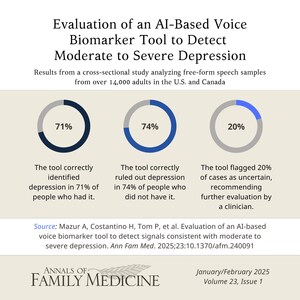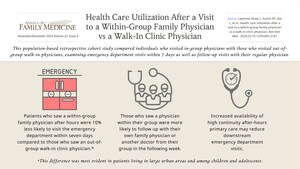Annals of Family Medicine: Dutch Researchers Explore Reasons for Lack of Follow-Up After Positive FIT, Suggest Personalized Counseling from Family Practitioners May Help
ANN ARBOR, Mich., Nov. 29, 2022 /PRNewswire/ -- While the screening by Fecal Immunochemical Test (FIT) can detect colorectal cancers early, successful treatment depends on patients undergoing follow-up colonoscopies after testing positive. The original research paper, Reasons for no colonoscopy after an unfavorable screening result in Dutch colorectal cancer screening: a nation–wide questionnaire in the November/December 2022 edition of Annals of Family Medicine examines the reasons why some patients don't seek follow-up care after a positive FIT test.
A better understanding of why individuals do not follow-up has global implications for all individuals at risk of colorectal cancer (CRC) as it is best treated early.
The Netherlands started implementation of the two-step Dutch CRC screening program in 2014. All individuals aged 55-75 receive a FIT and an information sheet by mail. Those having a positive FIT (indicating an increased risk of CRC) receive the result plus a prescheduled appointment for consultation to discuss the follow-up colonoscopy by mail.
In this study, the researchers distributed a survey among 4,006 individuals who had received a positive FIT. Of the 2,225 respondents, 730 reported not having undergone a follow-up colonoscopy. Of those, 404 (55%) reported a contraindication for colonoscopy, including chronic illness, or having had a recent colonoscopy.
Other reasons individuals opted against follow-up care included:
- Having difficulty deciding to undergo colonoscopy or not
- Lack of opportunity to discuss the FIT outcome with their doctor
- The belief that the test result is a false positive
- The perception of having low estimated CRC risk
- Having trust in their own ability to self-detect CRC
- A belief that polyp removal was ineffective
- The perception that colonoscopies are uncomfortable
The strongest driver to follow-up with colonoscopy after a positive screening was the belief that a patient's family physician would support their decision. Given that a lack of knowledge, misperception of CRC risk, and/or decision–making difficulties hinder follow-up, the authors argue that improving knowledge and offering personal guidance might prove beneficial for FIT–positive individuals. They suggest personalized counseling from family practitioners may help.
Reasons for no colonoscopy after an unfavorable screening result in Dutch colorectal cancer screening: a nation–wide questionnaire. Lucinda Bertels, Kristel M. van Asselt, Henk C.P.M van Weert, Evelien Dekker, Bart J. Knottnerus
SOURCE Annals of Family Medicine

WANT YOUR COMPANY'S NEWS FEATURED ON PRNEWSWIRE.COM?
Newsrooms &
Influencers
Digital Media
Outlets
Journalists
Opted In





Share this article